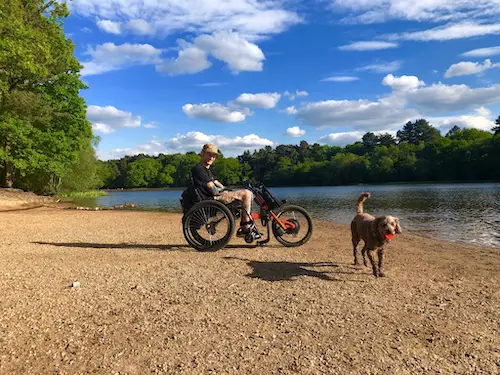
Why awkward conversations and intrusive questions about my disabled partner are not acceptable in society
If you have a disability or health condition or have a partner or family member with an impairment, you must have encountered many awkward conversations and intrusive questions from non-disabled people.
Becky Henley, a blogger at Head Over Wheels, recently shared a blog post about her experiences of shocking comments and insensitive questions she confronted about her partner Dan, who has Friedreich’s Ataxia, a rare condition that affects his mobility and therefore he uses a wheelchair.
Soon into my relationship with Dan, I realised that encounters of awkward conversations and intrusive questions are not uncommon for someone with a disability.
I also learnt that there would be people communicating with me in the same manner too. Whether we’re on a day out, have a tradesman in the house, or are at a medical appointment, no place or situation seems to be exempt.
Sometimes, people are brash and frankly a bit rude, some people are well-meaning but tactless, and others are ignorant, despite being in positions where they should be anything but ignorant to people with disabilities.
I’ll give some examples of times this has happened:
“What’s wrong with him then?”
I won’t say where we were, because the company provided a genuinely incredible and memorable experience for us, but it’s a perfect example of an awkward encounter. This was the first time I found myself thrown into one of these conversations when I wasn’t expecting it.
Dan and I were out for the day, having booked tickets for an experience/activity in the afternoon. We arrived, and the two of us spent more than an hour and a half with one member of staff (we’ll call him Pete!). He was friendly, engaging and helpful. He prepped Dan for the ‘main event’ (which I wasn’t actually going to be doing) and guided us through the experience.

When the time came for Dan to start the main part of the experience, Pete and I arranged to meet him at a different location ten minutes later.
As soon as we were out of earshot of Dan, Pete blurted out “What’s wrong with him then?”. I was pretty sure I knew exactly what he meant, but I was a little taken aback, and my response was “What do you mean?”.
After a brief pause, Pete asked “Why is he in a wheelchair?”. I stumbled for a second, then told him that Dan has a rare, neurological condition. We’d spent the whole afternoon so far talking about the day’s activity, enjoying the surroundings, and pleasantly chatting and laughing.
It was an undoubted shift in tone and came totally out of the blue. There was not even a hint that the conversation was heading that way, and the way it was worded felt rather negative.
I thought that Pete’s question was totally irrelevant, and the answer would have no bearing on the little time that Dan and I had left at the venue.
I think what I found most perplexing, was that Pete had just spent almost two hours with Dan. If he felt he wanted to know what Dan’s condition is, why didn’t he ask him?
I could only assume that he must’ve felt that it was inappropriate to ask Dan, but fine to ask me. I didn’t agree. I can’t say I felt annoyed, but I was disappointed at how it had been approached.
“Was it an accident, or was he born like it?”
There is no out-of-the-ordinary scene for me to set with this one; Dan and I were simply at home. Far from the exciting events of the time I mentioned before, this time we were just dealing with a broken boiler. It was winter (very close to Christmas) and the boiler was totally kaput, meaning we had no hot water or heating, and a large expense on the horizon. Admittedly, this might’ve contributed to the slightly sharper response I initially gave in this scenario.
We had a gas engineer come out, who confirmed what we thought – the very old boiler was beyond safe repair and we’d need a new one. We needed all sorts of work done during the replacement, so it would be a two to three-day job.
On the second day of the job, Dan was working from his office, rather than at home. Before I started work, I made a cup of tea for the engineer whilst he was working. As I handed it to him, he glanced at me and asked
“What’s wrong with your other half then – was it an accident, or was he born like it?”.
I quickly said “Neither”. I let that settle for a few seconds, and then having realised I’d perhaps been a little snappier than I would’ve liked to have been, I went on to explain that Dan has a degenerative, neurological condition that he was diagnosed with at nineteen.
No further questions were asked, and I got on with my day, as did he. Yet again, I was left wondering why someone had waited until Dan wasn’t there, and asked me about his disability.
“It must be tough for you”
Fast-forward eighteen months, Dan and I were in our new home and having some work done in the house. Due to needing quite a lot doing on our new bungalow, we were getting very used to having builders, plumbers, electricians, carpenters, plasterers, and window fitters amongst others, coming and going! Some had to come back several times so we built a good rapport with them and we’d often chat away with them.

On a sunny afternoon, I was talking to one of these tradesmen about the progress of a particular job we were having done.
At this point, he gestured into the house (where Dan was busy working at his desk) and said “It must be tough for you”.
Again, I knew exactly what he meant – I’ve become pretty accustomed to these conversations, but I innocently asked “What must be?”. The well-meaning man again gestured towards the house, and said “You know, having to look after Dan, as well as working and doing stuff around the house”.
I laughed and said, “You’re joking aren’t you – he probably does more cleaning than I do on a daily basis!”. I went on to explain that Dan is extremely independent, he has a bustling social life and is always busy. We look after each other, it’s not a one-way street.
This workman was probably trying to show genuine concern, and his comment was only well-intentioned. But that doesn’t make his assumptions about us right, or ok to voice them.
What’s the problem with people asking?
Dan has always been very open about his disability, and often has the attitude of “I’d rather people just ask”. What he isn’t as ok with, though, is people asking me when he’s not around, and the misconceptions that our life is a daily, sad, struggle.
When relative strangers ask me these questions, I am often torn between “Dan’s personal medical information is none of your business and is irrelevant to this situation” and “This is a great opportunity to educate and raise awareness of Friedreich’s Ataxia (FA), a rare condition needing more research and funding etc”.
I want to break down barriers surrounding disability, and help to raise awareness of FA, hence this blog, but there is a time and a place. It should be on our terms what we share and when. We’d much rather it wasn’t initiated by strangers when we are getting on with our daily lives, enjoying ourselves on a day out, or sorting out a new boiler!
What we prefer to talk about instead of disability
Funnily enough, we do get a bit tired of being asked the same questions all the time, and having to give our ‘go-to’ answer! We want to be able to make small talk, have lighthearted and carefree conversations, and a cheerful natter with the people we come across, and not have to explain why Dan needs to use a wheelchair.
Dan is not defined by his wheelchair; he is a funny, kind, intelligent and interesting man, so if you want to get to know him, his disability shouldn’t be the first thing you ask about!

Talk about things you would chat about with people who don’t have a disability: The weather, the news, hobbies, music, the local area. Sometimes, we simply don’t want to think about FA, we just want to get on with life.
Changes in language and respecting privacy
Even changes in language would make a difference in how these questions make us feel. Instead of asking me “What’s wrong with Dan?”, it would be better to directly ask Dan “Do you mind me asking what your disability is?” (or to not ask at all!).
I certainly don’t think people we barely know should voice their assumptions about how hard it must be for us, or start playing an out-loud guessing game of ‘what’s the reason for the wheelchair’ in front of us*.
Of course, disability brings its challenges, and it’s hard at times – but what relationship, or who’s life is always plain sailing, without any unexpected curveballs?!
We’ve had people ask all sorts, including if Dan “had a motorbike accident”, if he’s “a war veteran” and simply whether he “was born like it”!
When you ask someone “What is wrong with you?” or “Why are you in a wheelchair?”, you are asking someone to reveal an intimate and personal thing about themselves.
For some people, that might be upsetting, it might be hard to talk about, or traumatic, and not something they want to think about and discuss at that time.
I know that the vast majority of these people are not trying to frustrate us, upset us, or be purposefully inconsiderate, and I really don’t want to come across as miserable or unforbearing. We are simply keen to encourage people to think about how they interact with someone who has a disability.
Unless you are a friend, family member, medical professional or need to know in another official capacity, maybe wait until you know someone a bit better before you start asking them personal questions about their body, and disclose their condition to you.
By Becky Henley
You can find out more about Becky Henly and her partner Dan by visiting her blog Head Over Wheels and follow on Facebook, Twitter and Instagram.
More on Disability Horizons…
- Then Barbara Met Alan: a factual drama about the rise of the Disability Discrimination Act in Britain
- What is universal design and how will it benefit disabled people?
- What I have learnt about being in a relationship with a disability
- Treat your loved one with an accessible gift at the Disability Horizons Shop